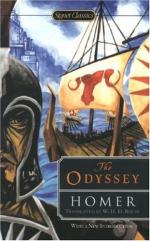To this Ulysses answered, “Amphinomus, you seem to be a man of good understanding, as indeed you may well be, seeing whose son you are. I have heard your father well spoken of; he is Nisus of Dulichium, a man both brave and wealthy. They tell me you are his son, and you appear to be a considerable person; listen, therefore, and take heed to what I am saying. Man is the vainest of all creatures that have their being upon earth. As long as heaven vouchsafes him health and strength, he thinks that he shall come to no harm hereafter, and even when the blessed gods bring sorrow upon him, he bears it as he needs must, and makes the best of it; for God almighty gives men their daily minds day by day. I know all about it, for I was a rich man once, and did much wrong in the stubbornness of my pride, and in the confidence that my father and my brothers would support me; therefore let a man fear God in all things always, and take the good that heaven may see fit to send him without vain glory. Consider the infamy of what these suitors are doing; see how they are wasting the estate, and doing dishonour to the wife, of one who is certain to return some day, and that, too, not long hence. Nay, he will be here soon; may heaven send you home quietly first that you may not meet with him in the day of his coming, for once he is here the suitors and he will not part bloodlessly.”
With these words he made a drink-offering, and when he had drunk he put the gold cup again into the hands of Amphinomus, who walked away serious and bowing his head, for he foreboded evil. But even so he did not escape destruction, for Minerva had doomed him to fall by the hand of Telemachus. So he took his seat again at the place from which he had come.
Then Minerva put it into the mind of Penelope to show herself to the suitors, that she might make them still more enamoured of her, and win still further honour from her son and husband. So she feigned a mocking laugh and said, “Eurynome, I have changed my mind, and have a fancy to show myself to the suitors although I detest them. I should like also to give my son a hint that he had better not have anything more to do with them. They speak fairly enough but they mean mischief.”
“My dear child,” answered Eurynome, “all that you have said is true, go and tell your son about it, but first wash yourself and anoint your face. Do not go about with your cheeks all covered with tears; it is not right that you should grieve so incessantly; for Telemachus, whom you always prayed that you might live to see with a beard, is already grown up.”
“I know, Eurynome,” replied Penelope, “that you mean well, but do not try and persuade me to wash and to anoint myself, for heaven robbed me of all my beauty on the day my husband sailed; nevertheless, tell Autonoe and Hippodamia that I want them. They must be with me when I am in the cloister; I am not going among the men alone; it would not be proper for me to do so.”




